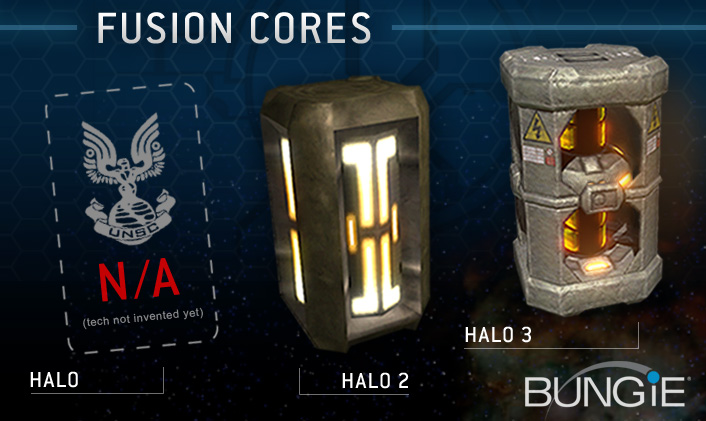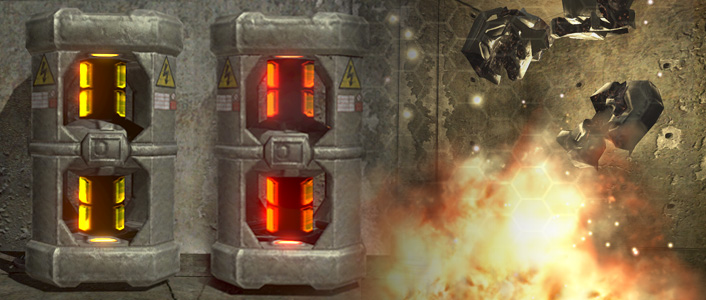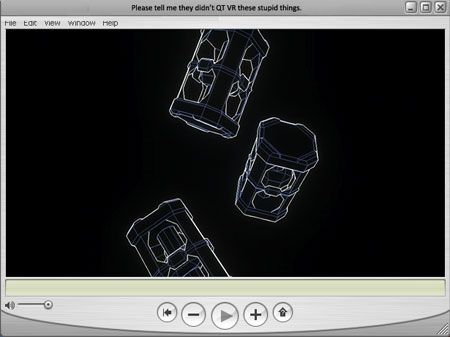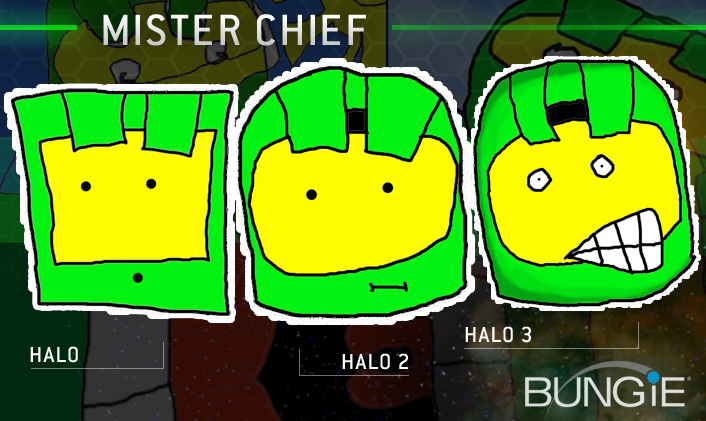Chronique:BWU 06/04/2007
Original
Posted by Frankie at 4/6/2007 4:33 PM PDT
This week, Matchmaking, rank resets, Cinematics and...drum roll...the evolution of Fusion Cores! Are you not entertained!?
Although you probably forgot about it, after two years of non-stop Multiplayer, Halo’s Campaign mode features lots of cinematics. Now in the past, these were put together by a hard working and talented team that basically comprised Joe Staten and CJ Cowan. And a keg of Pabst. One of the massive changes this generation is the addition of far more cinematics resources. We’re still going to do all the cinematics using the game engine as the basis (for continuity and immersion) but the sheer wealth of tools available to the cinematics team now is staggering.
One of the long-term additions to that team is Lee Wilson, a bona fide Hollywood storyboard artist. He frames and composes many of the amazing shots you’re going to see in the cinematics this time, working in close concert with CJ and Joe. Although Lee is straight out of movie production, he is also a comically stereotypical cheery cockney chappy. Honestly, sometimes I expect him to come in with a chimney brush and a cloth cap singing, “Mary Poppins, Step in Toime!” He is also the greatest plasma grenade stickmeister ever to fight his way out of Saaaarf London.
The beauty of this storyboarding approach is that it eliminates much of the compromise that often goes into the process. A shot is framed – and then it’s replicated by animators and artists pretty much exactly as it was imagined.
In Halo 3, the animation resources available to us are deeper and broader, and the sheer volume and quality of animation is increased exponentially this time around. I’ve already been watching some of the roughed in animatics, and more excitingly, the fully integrated stuff in-game. Right now, it has a lot of placeholder audio and music, but as those layers are spliced in, it’s going to become even better.
I noticed this with a subtle example - a Marine tech sits on a muddy berm and examines a pice of equipment. He shuffles to get comfortable. Now, this kind of subtlelty is hardly new to any form of animation, but it's a good example of how much extra care and energy we're committing to this important area of the Campaign game.
Although there are a ton of straight up technical improvements – such as better lighting, or more realistic faces – stuff like our new lip-synching tech takes a back seat to the actual events going on in the cinematics and the vignette-style cutscenes. From the first level of Campaign, to the final moments of the trilogy itself, we hope to bring you a compelling and stunning conclusion to the story arc and the technology ramp that we’ve built ourselves.
And speaking of technology…
Perhaps the single greatest improvement, and the one on which we have spent most of Halo 3’s development time and resources on, is the trusty UNSC Fusion Core. The safest, most intelligent way to transport and store highly explosive compressed plasma energy. Think of it as a Faberge Egg, filled with plutonium and nitroglycerin. Of course, the reason these things are stored in flimsy glass and aluminum containers it top secret. Suffice it to say that the answer is very scientific.

The first fusion core was pretty, but lacked the necessary warning signage seen in the new, improved Halo 3 Fusion Core. The new improved Fusion Core will become important in strange, secret ways in Fall 2007. Consider yourself warned.

Here we see the three stages of Fusion Core "stability" from inert to face-meltingly assploded. The trick is to not use them as desks, or hiding places. Rolling and stacking them can be deadly, or rewarding. Depending on your level of skill and patience. Everything you see here is in-game, except the hexagons.
The noble Fusion Core didn’t even exist in Halo. The Xbox at that time, simply couldn’t handle the truth: The truth being that storing explosive superheated radioactive materials in teetering stacks is the wave of the future. So we had crates. And non-explosive boxes. For Halo 2, we decided that crates needed a little more flava – and in this case, the flava was muy caliente! Enter the Fusion Core.
It is a well-known scientific fact that much of an adult brain is devoted to recognizing exploding objects in video games. MRI techniques have shown that up to 80% of your brain’s potential power is actually used for that, and knowing that coins or a rocket launcher are hidden behind a waterfall. The Fusion Core is our homage to your brain’s higher functions. In a Western themed game, it would be a barrel of gunpowder. But this is the future.

3D Fusion Core QT VR Apocalypse. It's provocative. It gets the people goin'. Right Click image to Save As. Use arrow keys to rotate! Are you still not entertained!?
Fusion Cores can be used as weapons, or as traps. Personally I liked tipping them off the elevator in Ivory Tower, or shooting them as an opponent walks by, rather than wasting bullets on multiple headshots. In Halo 3, you’re going to need to use them a lot. Especially in High Ground. Conserve bullets – shoot Fusion Cores - It’s the green thing to do. Also, do not hide behind Fusion Cores. Why are we giving out all this information and imagery about Fusion Cores you ask? Well because they’re about the least top-secret thing in all of Halo 3, and also to distract you from the slightly bad news below. But keep reading, because the news eventually gets better. And then much better.
Sketch’s Halo 2 Matchmaking Update! Read this! It is very, very important.
As you know by now, we’re just over a week away from unleashing two brand new Halo 2 multiplayer maps upon the world. “Desolation”, a remake of the Halo 1 map Derelict, and Tombstone, a remake of the classic “Hang ‘em High”, are both being released on Xbox Live on Tuesday 4/17. For the bargain price of $4.00 you’ll be able to unleash a new can of whoop-ass on these completely re-imagined multiplayer arenas. We’ll have a lot more to say (and show) about each of these maps next week as part of our continuing coverage on Bungie.net.
However, before we can release the new maps, we need to release a new auto-update for Halo 2. My sources tell me this is likely happening at some point next week and there could be a small interruption in play while this update is being deployed.
The primary purpose of this update is simply to enable the game to recognize the new content but we’ve also taken the opportunity to enhance some of our existing Banhammer functionality. This will be transparent to our legitimate players but suffice it to say that we’ve got a few new bells and whistles under the hood that should hopefully further combat and deter cheaters and jerks who are still trying to ruin your fun online. They will know immediately that something has changed.
This update will clear your online networking history which means that for a short period of time, the game won’t have any record of your ideal network capabilities which means you could experience some shaky games until things settle down. Basically over time the game learns what size games you can reliably host in order to give you the best possible experience but initially it’s not going to know if you’re on dial-up or a T1. This should return to a peaceful state of harmony after a few games. It’s also worth noting that the update will erase your “map cache” on your Xbox – this means that the first few games you play after the update could take a little longer than usual to load the maps since they’ll have to be freshly loaded into memory. This also means that the maps will need to be loaded from your Xbox game disc, so if you have a scratched or damaged disc, you could encounter some errors that you might have noticed before since the maps were previously already cached.
The point to all of this is just to let you know that longer load times and potential rocky games are expected and perfectly normal but everything will return to the way it was after you play a few games.
We are currently planning to update the Halo 2 matchmaking playlists the week following the map release (around 4/24). You’ll have some time to download the new maps but once the playlist update comes, please be aware that almost all playlists will require the new maps to play. You can of course play custom games and offline games as much as you want as soon as the maps are released, but on or around 4/24, you will need the new maps to enjoy the majority of the playlists offered in matchmaking. Lastly, in conjunction with a new auto-update, new maps and fresh playlists, we’re going to RESET ALL RANKINGS for Halo 2.
The last time we did a ranking reset was the release of the map pack and corresponding auto-update and we feel it’s right to do it again since the online landscape will be changing. This reset will also even the playing field in a world where the population has diminished somewhat and the majority of players are spread far across the level spectrum. It will pull everyone back together again and make it easier to get into games.
It’s awesome that we still have a steady group of people playing Halo 2 even today and we’re really looking forward to invigorating the online game one more time with new maps and a fresh ranking start before we look towards Halo 3. As always you can share your suggestions, requests and comments about matchmaking in our Optimatch forum here on Bungie.net. Thanks for your support and we’ll see you back on Xbox Live soon!
Thanks Sketch, and now back to our regularly scheduled programming.
Audio has seen some noticeable improvements too. Honestly, it’s sounded about perfect for months, but they just keep adding layers to it. Last night during a multiplayer test I heard a few new sounds – including a very convincing waterfall sound in Valhalla, that works really well over distance, and a new sniper ricochet sound that made me poop mah pants. It spanged off a rock behind my head, and even though I had missed the sniper contrail, I knew I was in jeopardy. It sounds hot and fast and frightening. And it isn't just one sound - it's lots of different effects, each scarier than the last. The ricochet sounds are backed up by (in Valhalla at least) a distant echo of the report itself, arriving fractionally after the bullet itself.
The distant muffled battle sounds continue to amaze me, and they’re being tuned frequently. They sound so real, that it’s hard not to think of them as an ambient soundtrack – but they’re all made by real gunfire in the distance. I also noticed a subtle, brief distortion sound when using team chat – kind of a futuristic mic crackle. It’s subtle and brief, but it’s there. Marty laughed when I said I’d noticed all this new stuff in the public beta build and pointed out that his guys (Jay and C Paul) were still adding tons of cool new stuff. And that I would be “amazed.”
Best of all; you guys will get to hear this stuff for yourself in the Public Beta later this spring (more news on that fairly soon) and you’ll get to see how much the graphics have changed since the Alpha. The Public Beta itself will probably be the very first opportunity for you to see some of the new lighting, textures and decorator effects – even the next Vidoc feature (coming soon, but sometime between now and the Public Beta) only features graphics from the Alpha build.
So yeah. Big changes coming. Big changes and big news. Next week is going to be significant. Until then, enjoy this potted history of Mister Chief's evolution.
